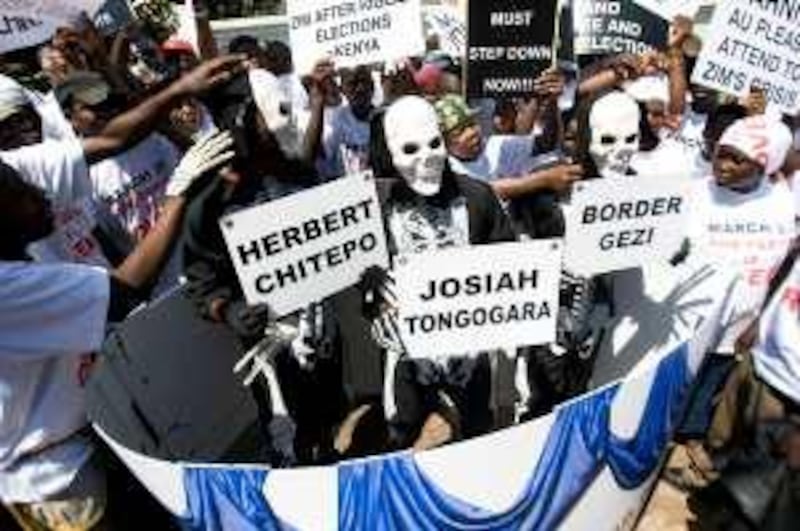JOHANNESBURG // After a victorious guerrilla struggle for independence, it is often the leader of the liberation movement who swaps his combat fatigues for a suit and tie and goes on to head the new government. But that did not happen in Zimbabwe. A mere five days after the Lancaster House Agreement was signed in London in December 1979, ending the armed conflict in white-ruled Rhodesia and paving the way for democratic elections, Gen Josiah Tongogara, the commander of the Zimbabwe African National Liberation Army, was dead.
Officially, he died in an accident in Mozambique, when his car hit a military vehicle as he travelled to the border and a return to the country that would shortly become Zimbabwe. A revered figure and a supporter of unity between the separate independence movements - who had grown up living on the farm of Ian Smith, the prime minister of white Rhodesia - his demise cleared the way for Robert Mugabe, the head of the movement's political wing Zanu, who was swept to power as prime minister in March 1980, to assume the overall leadership.
It also raised questions that have never been fully answered. Mr Mugabe said the death was a tragic accident, but with Zimbabwe's post-independence history at times extremely bloody, he also once declared that he has "several degrees in violence". Despite it happening three decades ago this month, an activist group, Zimbabwe Democracy Now, is demanding a multiparty inquiry, placing a large advertisement to that effect in the country's independent newspapers last week.
With the headline, "Josiah Tongogara, 30 years of silence", it read: "He never made it back from exile and was denied his rightful place in the leadership of the nation. "Since that time, millions of words have been written about the war; many who took part have become rich and our country has gone from the second largest economy in Africa to one of the poorest in the world." It also cited the death of Lookout Masuku, the leader of the rival Zimbabwe People's Revolutionary Army, who died in hospital in 1986, shortly after being released from Mr Mugabe's prisons, where he was held after being accused of planning a coup d'etat.
"No more silence," it concluded. "No more killing of our heroes. We want answers and we want them now, because staying silent will never set us free." Ethel Moyo, the spokesman for Zimbabwe Democracy Now, said suspicions still persist that Tongogara was murdered. "He was seen as someone who could build lasting peace and reconciliation with his enemies - traits which would have been invaluable in Zimbabwe today.
"For any future reconciliation to take place, the truth of his death must finally be revealed." A number of the president's political opponents have met unfortunate ends over the years, often on the road, and have frequently gone on to be buried at Heroes' Acre, the national cemetery on the edge of Harare, with Mr Mugabe presiding over their funeral rites. The burial ground includes Soviet-style bronze panels depicting him inspiring the struggle, and was designed by North Korean architects to resemble an AK-47 assault rifle split lengthways and butterflied open.
Soon after being linked to an alleged coup plot against Mr Mugabe in 2007, Brig Gen Armstrong Paul Gunda died when his car crashed into a train at a level crossing - an astonishing accident given the infrequency of rail services in the country. In the following weeks public information broadcasts on state television warned viewers: "Remember, you cannot win an argument with a train." In 1994 Chris Ushewokunzwe, the commerce minister and a supporter of market-based land reforms, rather than seizure, was involved in three separate accidents in 48 hours, dying when his vehicle hit an army lorry. At his funeral his brother Herbert, in comments believed to have been aimed at Mr Mugabe, said: "Now that you are killing and burying everyone, who shall be left to bury you when you die?"
Tongogara himself was also accused of selective assassination, even of his own comrades: he was blamed in an official Zambian government report for the death of Herbert Chitepo, the then Zanu leader, in a car bomb in Lusaka in 1975 - although the commander of Rhodesia's Selous Scouts, Lt Col Ron Reid-Daly, later admitted the white regime's security forces were responsible. Sydney Masamvu, a Zimbabwe analyst with the International Crisis Group, was in no doubt that Tongogara was murdered - and expected more deaths in the future. "The bottom line is that it was an ethnic thing to eliminate him," he said.
The military leader was a member of the Karanga, the largest clan of Zimbabwe's dominant Shona-speakers, while Mr Mugabe is a Zezuru, the second-biggest grouping, he pointed out, saying the death put the Zezurus "in the driving seat for 30 years". Joyce Mujuru, Mr Mugabe's vice president, is also a Zezuru and the favourite to succeed him after successfully repulsing a challenge at the ruling Zanu-PF's party congress last weekend from her great adversary Emmerson Mnangagwa - a feared securocrat who is a Karanga and no less than Tongogara's brother-in-law.
"The battle in Zanu-PF is taking an ethnic dimension," said Mr Masamvu. "With Joyce Mujuru remaining unshaken the Zezuru hegemony is bound to continue but the Karanga believe it's now their turn. "The history of elimination is there in Zanu-PF ever since the liberation struggle. There will be blood on the carpet, literally, when the penultimate phase of the fight to take over from Mugabe, which is now, reaches the home stretch."
foreign.desk@thenational.ae





